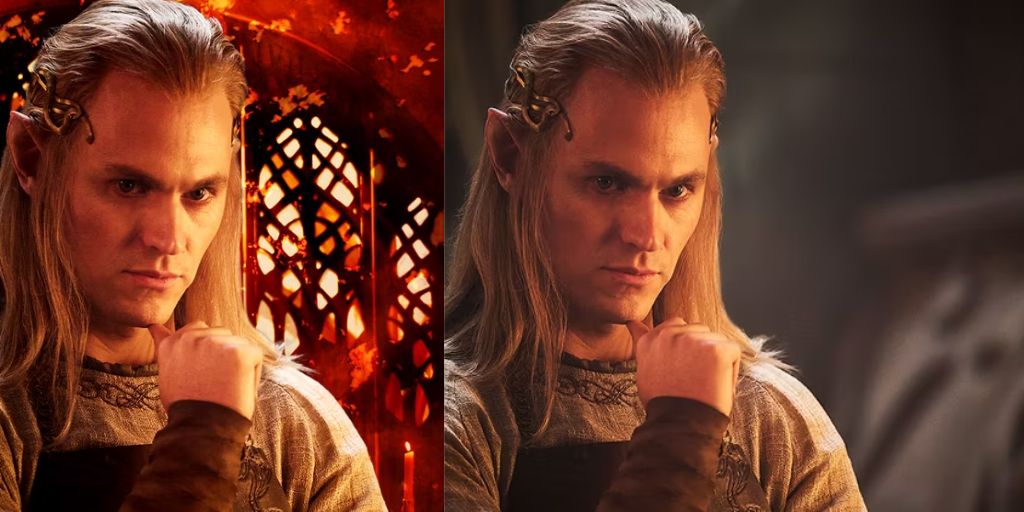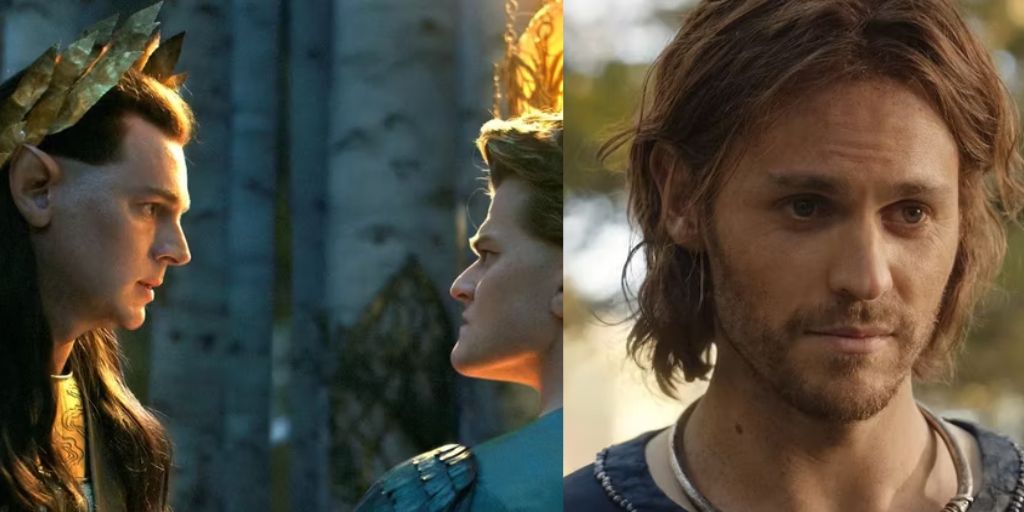“I have many names.” This phrase is said many times by Sauron (played by Charlie Vickers) in The Lord of the Rings: The Rings of Power. As a master deceiver, it makes sense for Sauron to have many names. His constant repetition of this quote has even turned it into a popular meme among fans.
In the Season 2 finale, titled “Shadow and Flame,” Sauron says this line to the Orc Glüg (played by Robert Strange) right after he kills Celebrimbor (played by Charles Edwards). This raises an interesting question: just how many names does Sauron have?
Sauron Is Not His Preferred Name, Actually
In The Rings of Power, the main villain frequently calls himself Sauron, especially after his true identity is discovered by Galadriel (played by Morfydd Clark) at the end of Season 1. However, Sauron is not his original name, nor is it the name he prefers.
The character we know as Sauron is a Maiar, which means he is an angelic being. When the universe was still very young, he served as a smith under the Valar Aulë. At that time, his name was Mairon, and that is the name he still likes to be called.
The name “Mairon” comes from Quenya, which translates to “the admirable” or “the excellent.” It is easy to see why he would prefer this name; it reflects a sense of greatness. However, Mairon’s path changes when he is corrupted by Melkor, who is also known as Morgoth, the dark Valar.
Mairon followed Morgoth into Middle-earth, and as time passed, the Elves began to refer to him as Sauron. The name Sauron translates to “the cruel” or “the abhorred.” Even though he became evil, Sauron always saw himself as a champion of order and efficiency. Therefore, being called “the cruel” is likely very upsetting to him. Unfortunately, the names we dislike the most often stick with us, and that is what happened to Sauron.
When He Served Morgoth, He Had Two Other Names
Sauron served Morgoth for more than an entire age. During the First Age, he had many encounters with the Sindarin Elves, who called him Gorthaur. This name became associated with him as he became Morgoth’s most trusted lieutenant.
The name “Gorthaur” combines two elements from Sindarin: “gor,” meaning “horror,” and “thaur,” meaning “abominable.” Some translations suggest it could also mean “Mist of Fear” or “the Cruel.”
Another name that is connected to Sauron during the First Age is Thû. This name is less well-known and appears in J.R.R. Tolkien’s early drafts of The Silmarillion, especially in the Legendarium surrounding the story of Beren and Lúthien.

The exact meaning of Thû is not clear, but it is often linked to a sinister, shadowy presence. In later versions of Tolkien’s writings, the name Thû was replaced with more familiar names like Sauron and Gorthaur, but it still remains in some older texts.
In ‘The Rings of Power,’ We Learn Two of Sauron’s Names
The Rings of Power introduces a new name for Sauron in Season 1: Halbrand. The true meaning of this name is never explained, but it likely combines the Sindarin word “hall,” which means “tall and massive,” and the Noldorin word “brand,” meaning “exalted” or “high.” This fits with his story of coming from an ancient line of kings in the Southlands, as well as with his not-so-humble sense of self.
Another name Sauron uses in Season 2 appears in Episode 2, titled “Where the Stars Are Strange.” In this episode, Sauron disguises himself as an emissary from the Valar, calling himself Annatar.
This name translates to “Lord of Gifts” in Quenya. It uses the elements “anna,” meaning “gift,” and “tar,” meaning “lord.” This name is fitting as he tries to persuade Celebrimbor to forge the Rings of Power.
There is yet another name that may be revealed in Season 3. Ar-Pharazôn (played by Trystan Gravelle) eventually invades Mordor and takes Sauron back to Númenor as a prisoner. However, Sauron quickly becomes the king’s advisor, going by the name Zigûr, which means “the Wizard.” During this time, he influences Númenor, leading to its eventual destruction.
Sauron Is Also Known by Some Dreadful Titles
Sauron is known not just by many names, but also by various titles. The most common title is “the Dark Lord.” After this, there is a long list of other names and titles. For example, in the Third Age, Sauron settles in the abandoned fortress of Dol Guldur.
He aims to reclaim as many Rings of Power as possible and regain his strength, as shown in The Hobbit. During this time, he disguises himself as a dark sorcerer known as the Necromancer. Even after leaving Dol Guldur, some people still call him that.

Many years later, Sauron created the famous sigil of the Eye of Sauron. Because of this, many people simply refer to him as “the Eye” when talking about him. This title is widely recognized and shows the fear he instills in others.
However, the most epic title he holds is the one that gives the whole franchise its name. Due to his influence over the Rings of Power, he is called “the Lord of the Rings.”
This title is mentioned by Celebrimbor both in pity and mockery before he dies in the Season 2 finale. While this title sounds impressive, it also highlights how dependent Sauron has become on the rings. He struggles to separate his own identity from them.





